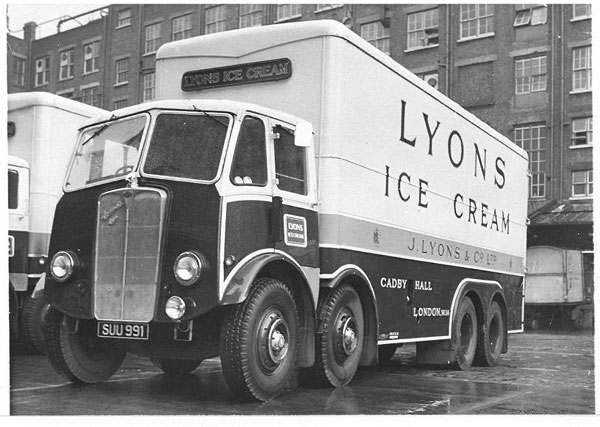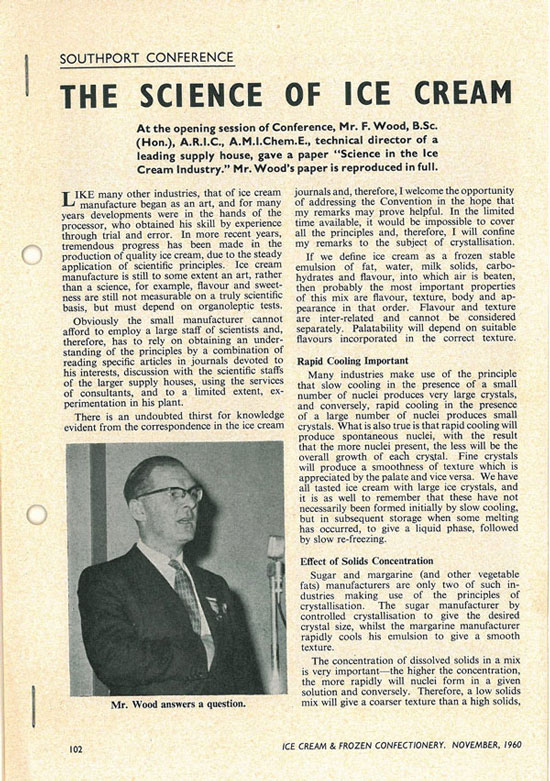Ice cream may not be all that appealing at the moment, given the recent snowy weather. It’s a time when most of us just want to wrap up warm and eat comforting stews and soups. I, however, have spent a week rummaging through boxes of material from the Lyon’s collection at London Metropolitan Archive (LMA).
Result: Now ice-cream is all I can think about…

‘Lyons Ice Cream Van’ from the Lyons Maid Collection at LMA
The purpose of the Interpretation Team at LMA, of which I am part, is to pull new audiences into the archive by drawing attention to parts of our collections in relation to current trends, annual events and the national curriculum. With National Science Week approaching in March, I have been tasked with finding ‘the science’ within our collections, with the aim of using some of our documents to form the basis for new workshops, films and conferences that would appeal to a new audience – perhaps those that are interested in the development of science, scientists themselves or teachers looking to take science out of the classroom.
A key area of development for us is working with schools and colleges to provide interesting and relevant workshops to children which support their classroom learning. This year we are offering new science focused sessions, Towers and Bridges, Sweet London and Document Doctors, all of which have supporting resources taken from within the archive collections. My particular favourite (and the cause of my current fixation on ice cream) is Sweet London. The focus is to highlight science within the everyday, getting children to look for it within their homes and routines. By using the Lyons Maid Company archive at LMA, Sweet London is a workshop that helps us to pull both cultural history and scientific advancements together to create an exciting lesson focused on the development of refrigeration, and how this led to the mass manufacturing of ice cream, ice-lollies and choc-ices.
The children are introduced to documents, photographs, publicity and recipes from the papers within the Lyons Maid Company collection as well as notes and information from the company’s science laboratories and test centres. Using these documents, they are encouraged to investigate the properties of sugar and ice cream, looking for the scientific processes taking place in the making of food, and drawing attention to the practical use of science in the context of an ice cream factory. Diagrams of machinery are shown, as well as the notes of the scientists examining the properties of ice cream and its ingredients. The documents and photographs are especially good at demonstrating a correlation between the advances in technology and the availability of frozen foods to a wider range of people across the country. Photographs of ice cream vendors are displayed, from early images of men with wooden carts to the much later, easily recognisable, branded vans of the Lyons Industry.
The workshop culminates in an ‘experiment’ in which the children are able to make their own ice cream using a bag of ice, and some milk and flavouring. (You put a sealed bag of flavoured milk inside another bag of ice and shake.) So, not only is the workshop great fun for the staff and children alike, it is also a really exciting way to use archival material and bring it to life. The children leave with a better understanding of the processes taking place inside the bag of ice and milk, whilst gaining knowledge of the way that our understanding of science has changed and developed over time, and the ways in which we have been able to put this learning to good use.
This week we are demonstrating this ice cream-making technique during an evening launch of our new Frozen London exhibition, which illustrates the history of the frost fairs on the river Thames. There have been murmurings amongst the LMA staff for some time now, asking for a workshop for ‘the grown ups’, and so we plan to use the appropriately-titled exhibition as an excuse to make as much ice-cream as we can eat collectively in an evening… (fingers crossed the unorthodox technique works!)

According to Wikipedia ancient Greeks first enjoyed ice creams (mix of snow, honey and fruits). Hippocrates “encouraged his Ancient Greek patients to eat ice”.